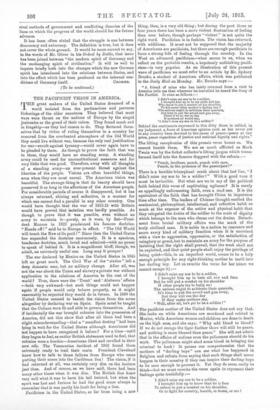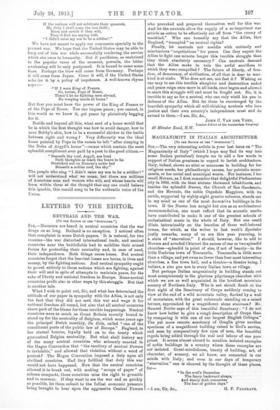THE PACIFICIST VISION IN AMERICA.
THE great makers of the United States dreamed of a world isolated from the pertinacious and perverse bickering. of the older countries. They believed that most wars were thrust on the nations of Europe by the stupid jealousies or the greed of their rulers. They found much evil in kingship—as they had reason to do. They flattered them- selves that by virtue of ruling themselves in a country far removed from the overheated atmosphere of the Old World they could live without war, because the only real justification for war—revolt against tyranny—would never again have to be pleaded by them. As though to prove the faith that was in them, they would have no standing army. A standing army could be used for unconstitutional measures and for very little that was good. Therefore, away with all thoughts of a standing army—an ever-present threat against the liberties of the people. Visions are often beautiful things, even when they are most unreal. The American vision was beautiful. The strange thing is that its beauty should have preserved it so long in the affections of the American people. For considerable periods of course it disappeared, but it has always returned, shining and seductive, in a manner for which one cannot find a parallel in any other country. One would have thought that the war of 1812-15 with Britain would have proved that isolation was hardly possible. As though to prove that it was possible, even without an army to maintain it—purely, as it wore, by fiat—Presi- dent Monroe in 1823 proclaimed his famous doctrine. " Hands off !" said he to Europe in effect. " The Old World will touch the New at its peril!" Since then the United States has expanded the doctrine enormously. It is a spacious, handsome doctrine, much loved and admired—with no power to speak of behind it. It is a magnificent bluff, though, we admit, an extremely useful one. Long may it prosper!
The war declared by Mexico on the United States in 1845 left no great mark. The Civil War of the " sixties " left a deep domestic soar, but no military change. After all, was not the war about the Union and slavery a private war without application to the relations of America to the rest of the world P True, there were the Trent' and Alabama' affairs
• ----both very awkward—but such things could not happen again if people would only behave properly, as it might reasonably be expected they would do in future. In 1898 the United States seemed to banish the vision from the scene altogether by declaring war on Spain. Spain must be taught that the Cubans were fit and able to govern themselves. And if incidentally the war brought colonies into the possession of America, did not this show that after all there had been a slight misunderstanding—that a " manifest destiny "had been lying in wait for the United States although Americans did not happen to have recognized it before P For a time—until they began to feel, as earlier British statesmen used to feel, that colonies were a burden—Americans liked and revelled in their new Hie. The Venezuelan incident of 1902 found them extremely ready to trail their coats. President Cleveland knew how to talk to those fellows from Europe who came putting their noses into the Caribbean Sea! The vision, if it had returned at all, was certainly very dim on the horizon just then. And of course, as we have said, there had been many other times when it was dim. The British lion knew very well what it was to have his tail twisted, but when the sport was fast and furious he had the good sense always to remember that it was partly his fault for being a lion.
Pauificism in the United States, so far from being a new
thing, then, is a very old thing ; but during the past three or four years there has been a more violent fluctuation of feeling than ever before, though perhaps "violent" is not quite the right word. Pacificism is in fashion. The vision has returned, with additions. It must not be supposed that the majority of Americans are pacificists, but there are enough pacificists to force a strong tide of feeling through the country. In the West an advanced pa,cificisin—what seems to us, when we reflect on the probable results, a hopelessly unthinking 'mei& ciam—is very popular. As an illustration of this present wave of pacificism we must refer to an article by Mr. Sydney Brooks, a student of American affairs, which was published in the Daily Mail on Monday. Mr. Brooks says :— "A friend of mine who has lately returned from a visit to America tells me that wherever he travelled he heard the Song of the Pacifist. It runs as follows:— I didn't raise my son to be a soldier, I brought him np to be my pride and joy. Who dares to put a musket on hie shoulder, To kill some other mother's darling boy ? The nations ought to arbitrate their quarrels, It's time to put the sword and gun away.
There'd be no war to-day
It mothers all would say,
'I didn't raise my son to be a soldier l'
Behind the sentiments expressed in this ditty there is rallied, in any judgment, a force of American opinion such as has never yet in any country been devoted to the cause of peaco—peace at auy price, peace regardless of justice and national dignity and rights."
The lilting cacophonies of this prosaic verse haunt us. We cannot banish them. We are as much afflicted as Mark Twain was by the ticket collector's lilting jargon which trans- formed itself into the famous doggerel with the refrain :— " Punch, brothers, punch, punch with care, Punch, in the presence of the passenjare 1" There is a terrible triumphant crash about that last line, " I didn't raise my son to be a soldier!" With a good tune it must be invincible. But what are we to say of the political faith behind this verse of captivating ugliness P It is surely
an appallingly unforeseeing faith, even a mad one. It is the equivalent of the faith that has brought China to impotence time after time. The leaders of Chinese thought exalted the academical, philosophical, intellectual, and reflective habit so much at the expense of the active and physical habit that they relegated the duties of the soldier to the scale of dignity which belongs to the man who cleans out the drains. Detach- ment from brutal military affairs was the mark of the truly civilized man. It is noble in a nation to renounce and scorn every kind of military function when it is exercised with a view to aggression, oppression, or the satisfaction of
vainglory or greed, but to maintain an army for the purpose of insisting that the right shall prevail, that the weak shall not be exploited, and that quiet people shall enjoy the privilege of
being quiet—this, in an imperfect world, seems to be a holy enough principle for any right-thinking mother to instil into her darling boy. Let us rewrite the verse for her (since we cannot escape it) :—
I didn't raise any son to be a soldier,
I brought him up to hate all row and fuss.
But he will put a musket on his shoulder If other people try to bully us! The nations ought to arbitrate their quarrels,
It's time to put the sword and gun away,
But they will rue the day If they make mothers say,
"Well, after all, he's got to be a soldier !"
The paoificist mother of the United States does not say that. She looks on while Americans are murdered and robbed in Mexico, while American women and children are done to death on the high seas, and she says : " Why add blood to blood ? If we do not enrage the tiger further there will still be peace, and nothing is more blessed than peace." She will not admit that in the affairs of nations even the policeman should do his work. The policeman might shed some blood in bringing the criminal to book 1 It passes our comprehension that the mothers of "darling boys" can see what has happened in Belgium and refrain from saying that such things shall never happen in their country if they can inspire their darling boys to be men enough to prevent it. Yet they do seem really to think—but we must rewrite the verse again to represent their feelings quite truthfully :—
I didn't raise my son to be a soldier,
I brought him up to know that ho is free To refuse to put a musket on his shoulder, Or to fight for country, hearth, or home, or mo If the nations will not arbitrate their quarrels, My duty I shall none the less fulfil; Burn rind ravish if they will, They'll find me saying still,
"I didn't raise my son to be a soldier!"
We have not meant to apply our comments specially to the present war. We hope that the United States may be able to keep out of this war while successfully rendering the service which she owes to humanity. But if pacificism, as enshrined in the popular verse of the moment, prevails, the bitter awakening will be only postponed. It is bound to come some thee. Perhaps the blow will come from Germany. Perhaps it will come from Japan. Come it will, if the United States asks for it by a policy of impotence. A well-known rhyme says :— "If I ware King of France, Or, better, Pope of Rome,
There'd be no fighting men abroad, No weeping maids at home."
But first you must have the power of the King of France or of the Pope of Rome. You can impose peace ; you cannot, in (hie world as we know it, get peace by plaintively begging for it.
Beside and beyond all this, what sort of a home would that be in which the first thought was how to avoid danger, how to save Bobby's skin, how to be a successful shirker in the battle between right and wrong ? Very differently was the ideal home painted by Pope in the verses he left " after sleeping in the Duke of Argyll's house "—verses which contain the most splendid compliment ever paid by a poet to the good citizen:—
" Beneath thy roof, Argyll, are bred Such thoughts as teach the brave to lie Stretched out on Honour's noble bed Beneath a nobler roof, the sky."
The people who sing "I didn't raise my son to be a soldier!"
will not understand what we mean, but there are millions of American men and women who will, and whose hearts will burn within them at the thought that any one could believe this ignoble, this rancid song to be the authentic voice of the nion.



































 Previous page
Previous page